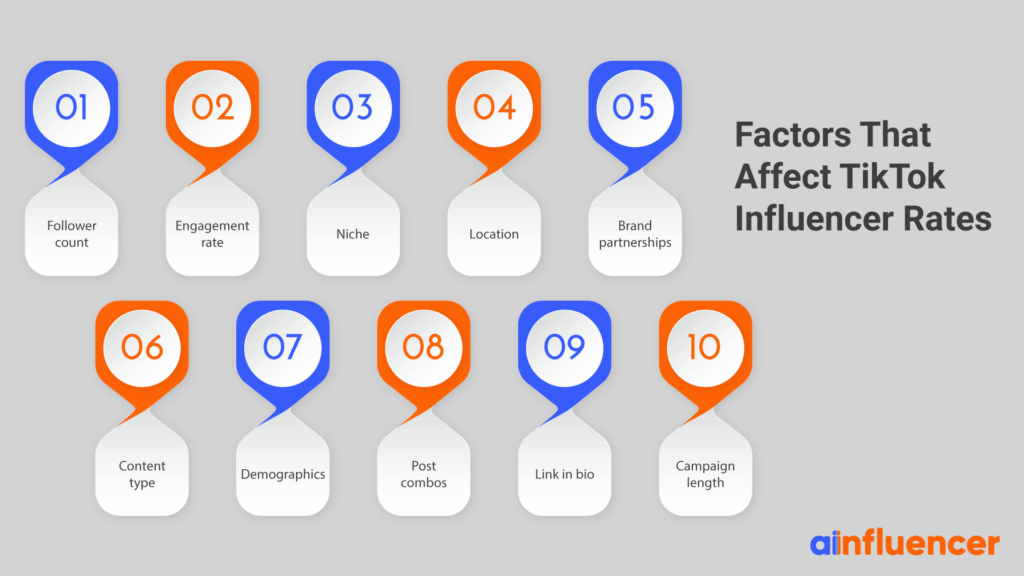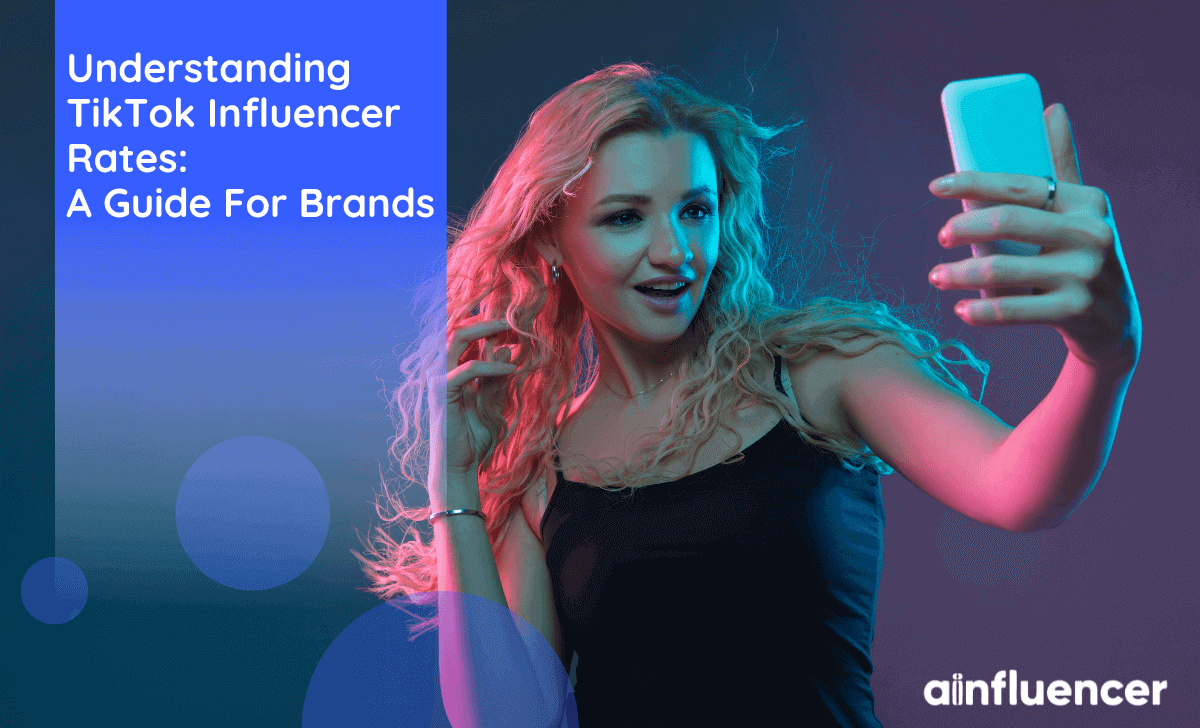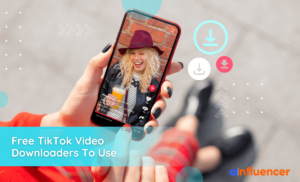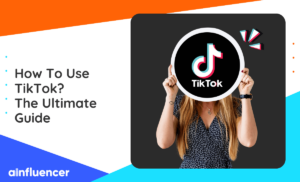Welcome to the world of TikTok, where creative content and engaging videos can make or break your brand’s success. With over a billion active users worldwide, TikTok has become a social media giant, and TikTok influencers have become powerful marketing tools for brands. However, when it comes to finding TikTok influencers and working with them, it can be challenging to understand the rates and how much to pay for their services.
In this guide, we will provide you with a comprehensive understanding of TikTok influencer rates in 2023, how they are calculated, the TikTok influencer pricing calculator, and what factors to consider when working with influencers.
Whether you are a small business or a multinational corporation, this guide will help you navigate the world of TikTok influencer marketing and make informed decisions to achieve your marketing goals. So, let’s dive into the world of TikTok influencer rates and learn how to maximize your brand’s potential on the platform.
How can I make money on TikTok?
There are several ways to make money on TikTok:
1- TikTok Creator Fund
TikTok offers a Creator Fund program that pays eligible creators based on their views and engagement. To be eligible for the Creator Fund, you must be at least 18 years old, have at least 100K followers, and meet other criteria set by TikTok.
2- Influencer marketing
Many brands are looking for TikTok creators to promote their products or services. You can reach out to brands, or they may reach out to you if they see that you have a significant following.
3- Merchandise sales
If you have a strong following, you can sell merchandise such as t-shirts, mugs, or other products with your branding on them.
4- Livestreaming
TikTok allows creators to go live and receive gifts from their viewers. You can earn money by receiving gifts, which can be converted into real money.
5- Affiliate marketing
You can earn commissions by promoting products or services through affiliate marketing programs.
6- Coaching and consulting
If you have a specific skill or knowledge in a particular field, you can offer to coach or consulting services to your followers for a fee.
TikTok influencer pricing
A sponsored TikTok typically costs $3,514. TikTok sponsorship cost ranks second highest after YouTube, where the average video price is $4,491. Even if a TikTok costs three times as much as an Instagram post, developing video content takes more time than doing so.
Using a TikTok influencer is your best option if you have a budget and want to address a younger audience. TikTok is expected to exceed Instagram’s 37.3 million Gen Z users this year, reaching 41.4 million. Additionally, the TikTok algorithm enables a higher level of involvement, which increases your likelihood of going viral considerably more than on other platforms.
Since TikTok is a much newer app than Instagram, the rates are even more varied. According to IZEA, the average cost per TikTok based on influencer tier is as follows:
- Nano influencers (1000 – 10,000 followers): $800 per post
- Micro influencers (10,000 – 50,000 followers): $1,500 per post
- Mid-tier influencers (50,000 – 500,000 followers): $3,000 per post
- Macro influencers (500,000 – 1,000,000 followers): $5,000 per post
- Mega influencers (1,000,000+ followers): $7,000+ per post
Factors that affect TikTok influencer rates

1- Follower count
The number of followers an influencer has is a major effect in determining their rate. The more followers an influencer has, the more valuable they are to brands and the higher the rate they can charge.
2- Engagement rate
Engagement rate is the percentage of an influencer’s followers that engage with their content. This includes likes, comments, shares, and saves. An influencer with a high engagement rate is more likely to be seen as an effective marketing tool and can command a higher rate.
To calculate the TikTok engagement rate of an influencer, you need to divide the total number of engagements on their content by their follower count and then multiply it by 100. Here are the steps:
- Determine the total number of engagements on the influencer’s content, including likes, comments, shares, and saves.
- Divide the total number of engagements by the influencer’s follower count.
- Multiply the result by 100 to get the engagement rate as a percentage.
For example, if an influencer has 500,000 followers and their last 10 posts have 25,000 likes, 3,500 comments, 1,500 shares, and 2,000 saves, their total engagements would be 32,000.
Engagement rate = (32,000 / 500,000) x 100
Engagement rate = 6.4%
Therefore, the engagement rate for this influencer is 6.4%. This means that, on average, 6.4% of their followers are engaging with their content.
3- Niche
The niche or industry that an influencer operates in can also affect their rate. Influencers in popular niches such as beauty, fashion, and fitness tend to have higher rates due to the large audience they attract.
4- Location
The location of the influencer can also affect their rate. Influencers in countries with a higher cost of living tend to charge more for their services.
5- Brand partnerships
The brands an influencer has previously partnered with can also affect their rate. Influencers who have worked with well-known brands in the past are often seen as more valuable and can therefore command higher rates.
6- Content type
The type of content an influencer creates can also influence their rates. For instance, influencers who create videos with high production values may command higher rates than those who only produce simple videos.
7- Demographics
The demographics of an influencer’s audience can also impact their rates. Influencers with an audience consisting of a specific demographic, such as young adults or females, may have a higher rate since they are appealing to a particular target audience.
8- Post combos
You might ask your influencer to produce content for two or more channels if you plan to use more than one platform. Although the post combo increases TikTok sponsorship cost, it extends the campaign’s reach by appealing to several audiences.
9- Link in bio
If your objective is to increase traffic, placing a link in your bio is a fantastic idea since you cannot include one in your TikTok or Instagram caption. This addition will likely cost extra.
10- Campaign length
TikTok influencer rates will be directly impacted by campaign length. A one-time activation, such as holding a competition or promotion, will be less expensive than a lengthy endorsement contract.
Conclusion
In conclusion, TikTok influencer rates have seen incredible growth in the past few years, and this trend is expected to continue in 2023 and beyond. With the right approach, brands can make good use of TikTok influencers to connect with their target audiences and build brand loyalty. Brands should keep up with the latest trends and industry best practices when negotiating rates and partnering with influencers. Ultimately, working with TikTok influencers can help brands reach more people while building strong relationships with their audiences.
FAQs
– Engagement rate: It refers to the number of likes, comments, shares, and other interactions an influencer receives on their TikTok videos. A higher engagement rate usually indicates a more engaged and loyal audience.
– Follower count: A high follower count is not always an indicator of a successful influencer, but it does suggest that they have a considerable following on the platform.
– Niche: An influencer’s niche or the type of content they create also plays an essential role in evaluating their impact. If their content aligns with your brand’s values or the target audience, they can be a good fit for collaboration.
– Brand collaborations: If an influencer has collaborated with other brands in the past and delivered results, it can be a good indicator of their ability to drive engagement and sales.
– Quality of content: The quality of an influencer’s content is crucial to their success on the platform. If their videos are visually appealing, creative, and unique, they are more likely to stand out and engage their audience.





![Read more about the article Top TikTok Trends Right Now to Try Today: [March 2024 Update]](https://blog.ainfluencer.com/wp-content/uploads/2022/07/Top-TikTok-Trends-To-Watch-300x182.jpg)



